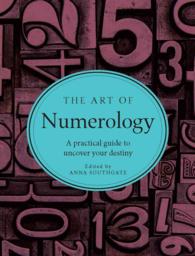- ホーム
- > 洋書
- > 英文書
- > Philosophy
Full Description
In the 1950s, long before his ascent to international renown, Michel Foucault published a scant few works. His early writings on psychology, psychopathology, and anthropology have been dismissed as immature. However, recently discovered manuscripts from the mid-1950s, when Foucault was a lecturer at the University of Lille, testify to the significance of the work that the philosopher produced in the years leading up to the "archaeological" project he launched with History of Madness.
Elisabetta Basso offers a groundbreaking and in-depth analysis of Foucault's Lille manuscripts that sheds new light on the origins of his philosophical project. She considers the epistemological style and methodology of these writings as well as their philosophical context and the scholarly networks in which Foucault was active, foregrounding his relationship to existential psychiatry. Young Foucault blurs the boundaries between biography and theory, exploring the transformations—and, at times, contradictions—that characterize the intellectual trajectory of a philosopher who, as Foucault himself put it, "turned to psychology, and from psychology to history." Retracing the first steps of the philosopher's intellectual journey, Basso shows how Foucault's early writings provide key insights into his archaeological work of the 1960s. Assembling a vast array of archival sources—including manuscripts, reading notes, notes for lectures and conferences, and correspondence—this book develops a new and deeper understanding of Foucault's body of work.
Contents
A Genealogy of Archaeology by Bernard E. Harcourt
Introduction: New Avenues for Research
1. Archives and Intellectual Networks
2. The Binswanger Dossier
3. Archaeological Method
Conclusion
Acknowledgments
Notes
Bibliography
Index








